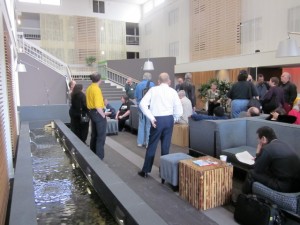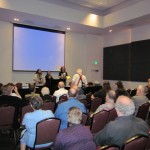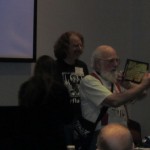
The backsides of great fanzine fans. A rare view, rather like that famous photo of Churchill.
THE ANNUAL FANZINE FANS’ GET-TOGETHER
The 2011 Corflu in Sunnyvale, California
by Marty Cantor
For a hot-house plant like me, even Los Angeles can be cold in February. But a sweater, jacket, overcoat, gloves, and a hat can take care of that whilst the interior of the car warms up. Even over the Grapevine, that gateway to a fast drive on the I-5 north from Los Angeles to the Bay Area. Or, to be more accurate, to Sunnyvale, in the heart of Silicon Valley.
Even in Buttonwillow, 100 miles north of my North Hollywood starting point, where I stopped to put gas into my car, and thence to grab a bite to eat in the rest stop just north of that burg, the cold was barely tolerable when I removed my gloves to remove money from my wallet to pay for the fuel at the gas station and to hold the sandwich I consumed at the rest stop.
But what really warmed me up was the listening to some of my favourite music on my way north. CD players built into automobiles are a boon for people like me, people who like music at least a bit out of the mainstream.
See, I started out listening to two CDs of the secular music from the Renaissance, wonderful sounds from 400+ years in the past. I then moved up 200 years and listened to a CD of Ludwig von Beethoven’s overtures – and then got all modern listening to Catulli Carmina and Trionfo Di Afrodite by Carl Orff, modern music only 100 years old. I was listening to Orff’s Carmina Burana when I pulled into the parking lot of the Domain Hotel in Sunnyvale, the venue for this year’s Corflu, a con celebrating a part of science fiction fandom which started in the 1930s and sometimes feels like it has barely left that time despite the embrace of modern zine-creating technology.
And almost the first thing I did after registering at the hotel and moving things to my room was to take three other con-goers in my car and drive to the Winchester Mystery House for a tour of same. This weird and wonderful 160-room, Victorian mansion which was continuously a-building for 38 years (until the owner died) seemed a fitting start to a con dedicated to the ideals of what started our hobby. (Unfortunately, we were not allowed to take photographs of any parts of the interiors of the mansion but photos aimed outward from porches and balconies were apparently not forbidden – and I shot some from those viewpoints.) Fandom does, of course, adapt to the new technology to continue producing fanzines, usually much easier to create than it was in bygone days; and, sometimes even showing better repro and other technical niceties.
This Corflu’s concom, though, tech-savvy as they were, did not keep their web site updated, so it was a decided shock to see some people show up who were not listed as members. Make that a “pleasant shock” in many cases, as non-listed Pat Virzi walked into the hotel lobby, and the totally unexpected appearance, walking down a hotel corridor, of Victor Gonzalez (with his wife, Tamara). Out of the past walked Gary Farber – or so it seemed at the time as I do not think that I had seen Gary since the 1984 Worldcon in Los Angeles. And, even though the day before I had been posting on an e-list where Graham Charnock was sending messages from London, England, awaiting the birth of his first grandchild, there he was in the hotel bar when I walked in.
One new person I met was Kat Templeton. On one or another of the e-lists I infest it had been mentioned that she was going to be producing a fanzine. I asked her about it and she told me it was half-finished. As, maybe, a spur to get her to do more fanzining, I handed her an envelope of Rotsler illos. I had used all of these illos during 2010 and I was originally going to give these to Earl Kemp for use in his on-line zine. But, with Earl not at the con this year, I saw no reason why I should not help a relative newcomer by giving her the Rotsler illos.
And one of those wonderful, unplanned happenings of cons are the totally unexpected connexions and meetings which spontaneously happen. I more or less slightly overslept on Saturday morning – but I was still the first person down for breakfast. I had just finished eating and was starting my second cup of coffee when Michael Dobson walked in and joined me. He told some interesting anecdotes about some people (non-fans) he knew in DC (where he lives) and we traded some anecdotes about Australia, a place we had both visited. At the time, I had been planning to take my second cup of coffee and walk up to my room and begin typing this con report on my computer, but it was really more interesting, talking to Michael, so I started working on this account about an hour later than planned. As cons are one of those things which are usually so interesting there is relatively no time during them to do any writing, the only time for typing is either before or just after breakfast for an early riser like me.
Friday night’s opening ceremonies were, well, opening-ceremony-like, with the only difference being me taking photographs with my brand-new camera. And, also, taking the microphone and announcing that I had copies of Len Moffatt’s fannish autobiography for sale, all proceeds to TAFF and DUFF. (A sudden weird thought – why is it always TAFF and DUFF rather than DUFF and TAFF? Probably it is because TAFF was here first rather than a more usual alphabetical listing. Still, some phrases always bother me because they are so backwards – like the phrase “back and forth”. I mean, how can one come back before one has gone forth? Et bloody silliness.)
As is the protocol at cons, at least for those of us who have been in fandom for awhile and who have attended some cons, almost more important than the usual official starting ceremonies are the individual greetings of those whom one has not seen since the last iteration of the con – especially at Corflus as this meeting of fanzine fans is often the only con attended by those of us who enjoy this part of fandom. Of particular enjoyment are the first meeting with fans with whom one has been corresponding in one or another milieu, often for some time, but with whom this is the first ever face-to-face meeting. such was the case in my meeting with Mike and Pat Meara, over from Old Blighty to experience the American iteration of Corflu and to see how it differs – if at all – from the English version of the con which they attended the previous year. Indeed, I met them almost as soon as I arrived at the con hotel. And they (along with Milt Stevens, the other Angeleno at the con) were my passengers as I drove them to the Winchester Mystery House, theoretically a 10-minute drive from the hotel – according to the map I downloaded before I left North Hollywood – but local traffic made that more than a bit of a joke. But get there we did, and I must say that we all enjoyed the tour of a house with cabinet doors which opened to blank walls, an outside door on a higher floor which opened up to open air and no stairs, a stairway up to a ceiling, a window in the floor, and many other strange constructions. Anybody interested in this over-large anomaly of a building can probably read about it in many places. Needless to say, joining with the British Sandra Bond and the three passengers she drove over from the hotel, we had a fascinating tour of this architectural pile.
After which we all returned to the hotel or went for a meal or did something before we went to the Opening Ceremonies. In my case, even though Milt and I shared a table in the hotel restaurant before going to the opening ceremonies, nothing much which happened on that Friday evening compared to the sensory overload of viewing the Winchester House. At the Opening Ceremonies I remember Carrie Root’s name being pulled from the box, therefore making her the Guest of Honour at this Corflu, but not all that much of what else happened at that event – except me making an announcement of the Len Moffatt autobiography which I had printed upon hearing of Len’s death. (This autobiography was a compilation of 9 episodes which Len wrote and which I had originally pubbed in nine different issues of my zine, NO AWARD (starting over 10 years ago).
Tired from all of this, I went to bed even earlier than usual. So, if anybody is interested in what I did at the room parties and such like at the con, please note that I am an early riser and rarely stay up until midnight at most cons. Indeed, even were I to stay up past midnight, I would be asleep anyway. A night person I am not – unless it is at the tail end of the night, as I awaken before sunup.
Programming at Corflus is always single track. Granted, there are not all that many people at these cons compared to, say, Worldcons, but these are all the sort of people with whom other fanzine fans love to hang around. And talk. And talk. And talk. So, even though whatever the programming at the con happens to be, tailored as it all is to the interests of fanzine fans, sometimes many of the attendees do not much bother the programming which is put on for their enjoyment/edification.
So be it.
This means that I missed the fannish trivia contest where four teams squared off to see which team knew the most useless information. The results, though: the Mike McInerny American team of John D Berry, Milt Stevens, and Gary Farber beat the Sandra Bond English team.
One item of interest was a slide presentation by Dave Hicks, a fanartist
brought to the con by the Corflu 50 group. Dave is a fanartist whose
artwork I would dearly love to showcase in any genzine I was putting
out. If I was putting one out …
In my case, I was only interested in the Fanzine Auction, put on at 8 on Saturday evening, given that I had brought items to auction off for DUFF. All of the items put up for bid at Corflu auctions are meant only for the support of various fannish charities, usually (and mostly) the various travel funds: TAFF, DUFF, GUFF, and the like. I have participated in fannish auctions before – as an auctioneer – and it turned out that this was to be no exception as Chris Garcia, the con chair, had not made arrangements for anybody else other than him to do the auctioning. As more and more fans straggled in from dinner, the auctioning got more spirited as more people began participating in the bidding. At the end of the scheduled hour, with only a few items left to auction, we called an end to the bidding so that those who had won items could pay for them and the next programme item could commence.
This was a fannish play, written by Andy Hooper. I always seem to enjoy reading them after the fact as I usually have conversations drag me away from the live productions – and this time was no different from the usual.
I went up to the con suite and got into some conversations, including a bit on the virtual con suite, a connexion to interested parties via the internet. This was most ably handled at the Corflu end by Kat Templeton.
Sunday morning saw Jack Calvert arriving for breakfast as I was going in for same. Yeah, I slightly overslept today, too. Jack is a member of LASFAPA, one of the two APAs I run, and he is also a member of Inthebar, the e-list founded by fan artist Harry Bell. As is all too common, I remember that Jack and I had a fine talk during breakfast, with me not remembering any of the details.
Sunday mornings at Corflus usually start slowly as the only scheduled programme item is the Banquet. Of course, eating food is only one of the things we do at the Banquet. The food at this Corflu’s Banquet was a brunch – in name, even though it was mostly breakfast food along with exceedingly spicy chili. Some of us who had already eaten breakfast at the hotel were slightly put out that essentially the same food for lunch. (An aside: a free, full breakfast was included in the price of our hotel rooms. Personally, I find that a wonderful change from the sweet roll and coffee combo called a free breakfast at some hotels. And, as a breakfast, it was very good.)
The food part of the Banquet was served in a room off the lobby of the hotel. So, when we finished our meal we moved to the room we used for Corflu functions, on a hallway in back of the elevators on the second floor. This is where the “business” of the con was then held. Starting with the nominations and voting for the Past President of FWA, Fanzine Writers of America. As explained by Ted White (who ran this part of the meeting), what the members of the con produce are fanzines, and whether drawn or typed, we are all writers, and no matter from whence we came, we are all Americans – at least for the purpose of FWA. And we always vote for last year’s President as there is never any current President of FWA. (Ted explained all this better than me but I was too busy taking photographs to write down any details.) Anyway, after some very spirited voting, Spike was voted Past President of FWA.
Then came the time for Spike to announce the winners of the FAAN Awards, with said Awards being carved on bronze plaques (by Tom Becker). First, though, there was a Special Lifetime Achievement Award given to Art Widner. Art got up to take the award and then sort of hesitated as he attempted to read the words on the plaque. Some wag – not me, this time – wondered, aloud, if the words on the plaque used Art’s spelling. Art mentioned something about them being in “dumb English.”
Below is a list of the FAAN Awards as voted on by fans:
Artist: Steve Stiles
Letterhack: Robert Lichtman
Fanzine: Robert Lichtman’s TRAP DOOR
Writer: Roy Kettle
Website: eFanzines.com
Carrie Root then gave her Guest of Honor speech; which, in her case, was a slide show of a visit with relatives and Andy Hooper to northern New Mexico. It was well received.
There was then a discussion of where Corflu would be held in 2012, with Ted White presenting a bid for Las Vegas as none of the Vegrants were able to appear at this year’s con. Many of us have good memories of the Corflus previously held in Vegas, so it was with good heart that Las Vegas was awarded the 2012 Corflu.
The end of the Banquet is traditionally the end of the programming at Corflu. The Con Suite will remain open until around midnight or so and there are still get-togethers and fannish food expeditions afterwards, but many people leave for home on Sunday afternoon and evening. Being theoretically retired – well, I run the apartment building in which I live as a supplement to my Social Security check – I usually stay at the hotel an additional night and start my drive home early Monday morning. As I did, this time, except I had the “pleasure” of having rain or drizzle as an accompaniment to my driving all the way south until I arrived at the Grapevine. From the beginning of my ascent into the mountains – and for the remainder of the day – the Sun was shining brightly. A fitting end to a fine con.

Art Widner rises to accept his Lifetime Achievement Award.

Art Widner deciphers his award plaque.




